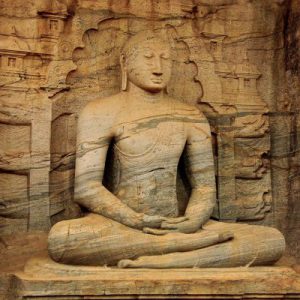Pāli Level 2
£79.00
This is the intermediate Pāli course of the OCBS Pāli course series.
Description
This course is the second step to your mastery of Pāli! It requires beginner knowledge of Pāli. For more information about our courses, see the description of our beginner course.
A few facts about this Pāli course:
Content: 24 Lectures, amounting to 3.5 hours + 24 Factsheets + 24 Vocabulary Lists + more than 200 Exercises
Duration: 4-5 weeks based on 3-4 hours of self-study per week
Difficulty: Intermediate (previous knowledge, equal to the content of Pāli Level 1, is required)
Note that once bought, your access to the course does not expire. When we update the course – for example by adding material or exercises – you will automatically have access to the new version.
This course is the second Level of our 3-Level Pāli instruction. Level 1 and Level 3 are already available.
Learning Objectives for Pāli Level 2:
- Understanding the different uses of the past participle in Pāli, including:
– Passive and active uses
– The past participle as a perfect tense
– The past participle as a historic narrative tense - Understanding some different applications of the instrumental case
- Understanding how to distinguish transitive from intransitive sentences, and the logical subject of a sentence from the grammatical subject
- Understanding other participles, including the present participle and gerundive
- Understanding the formation of -in declension nouns, and -in stem verbal adjectives
- Understanding the following aspects of the Pāli verbal system:
– The optative mood: how to express hypotheses and wishes/intentions
– The imperative mood: how to form commands and prohibitions
– The past or aorist tense
– The absolutive - Understanding important aspects of Pāli syntax in greater detail, including word order, and the use of idioms, enclitics and adverbs
- Understanding the three basic types of Pāli compounds: dvandva, kammadhāraya and tappurisa
- You will start to read ‘The Discourse on the Establishment of Mindfulness’ (Satipaṭṭhāna Sutta, MN 10 / DN 22)
9 reviews for Pāli Level 2
You must be logged in to post a review.





Rahul Ravi Rao –
This “Pāli Level 2” has really help me to understand the basic components of grammar and Sutta translation, more inclined towards vocabulary which is the major tool in learning the ancient language. Thankful to all of you for creating such an in-depth online course where all the features of course material available at the finger tip….
Chandler –
This is another great offering and if anything, a more valuable course than the first. I did find myself having to update my knowledge of grammar terms that I had not used in many years, and a few of the videos had more than one watch, but this is a part of the course design and was welcome. The course is a bit more grammar heavy than the last which made the jump between courses a bit more of a stretch for me, and the opportunities for application of learned material (in terms of translations) tapers off as the course continues on. For me, this made it a bit more difficult to know if I had truly grasped a couple of the lessons while going through the course. It also meant I was not as familiar with the grammar tables at the end of level 2 as I was at the end of level 1 – a personal failing in my opinion. Regardless, these concerns were gone by the end of the course when working through the Satipattana Sutta. It was a moment (or moments) of “Ah, now I see”. For anyone curious, the vocabulary lists are just as extensive as in the first course and possibly a bit more relevant than the first set. Ultimately, I went in Level 3 which is probably the best and simplest recommendation for the excellent quality of these courses.
A personal thank you to everyone involved with this work. It has been a pleasure having access to content of this quality anywhere in the world.
kovilo –
Professor Alex Wynne has been a fantastic teacher! Though assuredly busy with other things, the admin Alex Wrona took the time to respond to all comments I made throughout the course. And Prof. Wynne, as the primary teacher of the course, has done a wonderful job explaining certain Pali grammatical concepts (e.g. why past participles are used so extensively; how to read and translate passive sentences into English, etc.) which I had never heard or read explained so clearly. Bravo!
Overall, if the stars would allow it, I would give the course 4.90 stars. One thing I would like to see more of is test questions. That said, I am being greedy. This course is only one of two I know (the other being the testing tools available for Warder’s Intro to Pali on the pariyatti.org website) which have any test questions at all! And! The questions in this course were so enjoyably as to leave me wanting more. Perhaps 200- to 300% more.
For a thorough explanation on intermediate Pali grammatical concepts, this course is a worthwhile investment.
With gratitude,
Kovilo Bhikkhu
Neekee Chaturvedi –
A very rigorous course. I have completed the level 2 successfully but I am not sure I have retained everything. Fortunately I have unlimited access and I will go back to a few lectures. Very well designed with exhaustive resources provided.
Nutan Pol –
Pali Level -2, This course is very useful to understand the Sutta, as per grammatically. Professor Alex has been explained the explanation of Grammer Term in a very simple way. also, the study material is good. This is easy way to understand Grammer. definitely this course very helpful to understand the Teaching of the Buddha. Thank You OCBS Team.
Varanyani –
Thank you so much for offering another well-thought-out Pāḷi course. I especially found the lessons on enclictics, idioms, and compound very helpful; when reading sutta, I would feel frustrated not being able to understand enclicitcs and compound in detail, but now I feel confident about grasping the meanings of those Pāḷi words. It was also wonderful to read Satipaṭṭhāna Sutta together by analysing the sentences based on the grammar we have learned. I am now more excited about taking Level 3. But as suggested, I will review Level 1 and 2 before I go for level 3. It would have been great if the course could offer more example sentences through which learners can thoroughly assimilate each sentence structure with a certain grammatical point. But I can shout “kudos!” for this well-thought-out Pāḷi course. Thank you so much! May you be well and happy through the merits of offering this systematic Pāḷi course for the benefits of many. Sādhu!
cebarko –
Another wonderful offering. I am astonished at my understanding of Pali after completing this course, considering I knew nothing of languages at the start. As someone who has never studied any language including English 🙁 it felt very daunting to start to learn any language, especially an ancient one! The multiple methodologies of teaching, video, factsheet, and exercises are very useful in cultivating interest and creating opportunities for repetition. I found the translation exercises engaging and supportive in taking the material from merely an intellectual exercise to something I could use in practice. These types of activities would be useful for all lessons. The addition of a flashcard program or app would also be great in learning the vocab.
I have learned to read suttas in Pali with the help of Level 1 and 2. That is a fantastic feat and all from the comfort of my home. When I think of how easy the whole process was, it is quite unimaginable. Thank you for having the foresight to offer this online to everyone.
Marian Busoi –
Overall, it’s an excellent resource and really one of a kind when it comes to learning Pali online. I wish there was something similar for Sanskrit!
Catalin Iosif –
A few nitpicks – but I still have to give it 5 stars. The translation exercises were tightly packed into the first part of the course, while the second half had almost none. I would definitely enjoy more of these. Also, some questions could be a bit confusing, by referring to a notion in a different wording than was explained in the lecture. Otherwise, great content and structure. I find myself being able to translate a large part of the texts on my own, straight from the Pāli, just with a dictionary and the grammer tables.